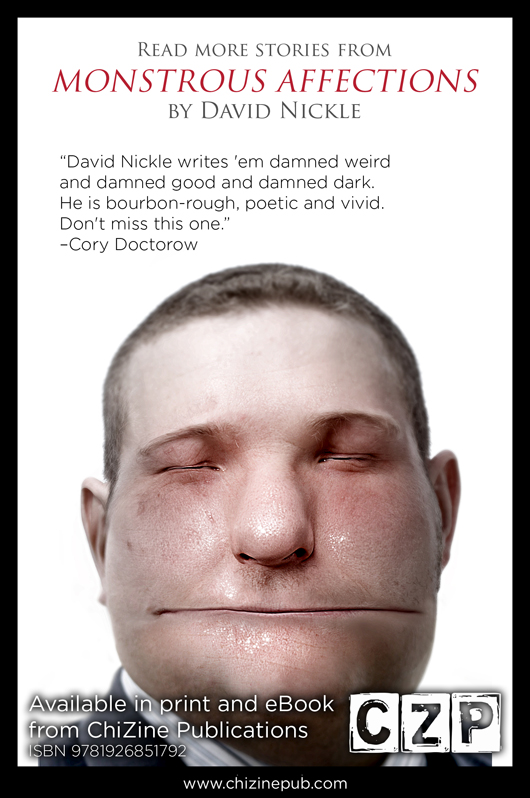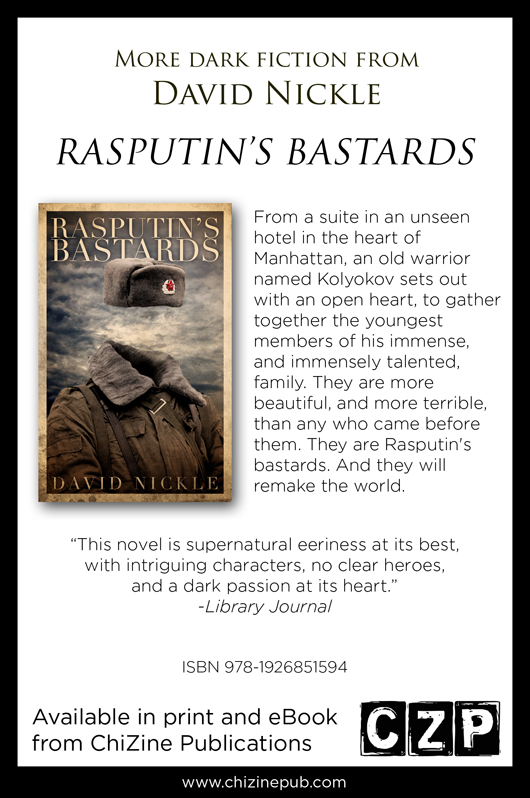The Sloan Men: Short Story (3 page)
Read The Sloan Men: Short Story Online
Authors: David Nickle
Tags: #Fiction, #Science Fiction, #Short Stories

“This is the place.” Judith had intended it as a question, but it came out as a statement of fact. This
was
the place. She could feel Herman, his father, God knew how many others like them — all of them here, an indisputable presence.
Mrs. Sloan stood, using the axe-handle as a support. “It is,” she agreed. “We’d better get to work on it.”
Mrs. Sloan hefted the axe in both hands and swung it around her shoulders. Judith stood back and watched as the blade bit into one of the drooping ropes, not quite severing it but sending a spray of green sap down on Mrs. Sloan’s shoulders. She pulled the axe out and swung again. This time the tube broke. Its two ends twitched like live electrical wires; its sap spewed like bile. Droplets struck Judith, and where they touched skin they burned like vinegar.
“Doesn’t it feel better?” shouted Mrs. Sloan, grinning fiercely at Judith through the wash of slime on her face. “Don’t you feel
free
? Put down the flashlight, girl, pick up the shovel! There’s work to be done!”
Judith set the flashlight down on its end, so that it illuminated the roots in a wide yellow circle. She hefted the shovel and, picking the nearest bulb, swung it up with all her strength. The yellow juices sprayed out in an umbrella over Judith, soaking her. She began to laugh.
It does feel better
, she thought.
A
lot
better.
Judith swung the shovel up again and again. The blade cut through tubes, burst bulbs, lodged in the thick round carrot-roots deep enough so Judith could pry them apart with only a savage little twist of her shoulders. The mess of her destruction was
everywhere.
She could taste it every time she grinned.
After a time, she noticed that Mrs. Sloan had stopped and was leaning on the axe-handle, watching her. Judith yanked the shovel from a root. Brown milk splattered across her back.
“What are you stopping for?” she asked. “There’s still more to cut!”
Mrs. Sloan smiled in the dimming light — the flashlight, miraculously enough, was still working, but its light now had to fight its way through several layers of ooze.
“I was just watching you, dear,” she said softly.
Judith turned her ankle impatiently. The chamber was suddenly very quiet. “Come on,” said Judith. “We can’t stop until we’re finished.”
“Of course.” Mrs. Sloan stood straight and swung the axe up again. It crunched into a wooden root very near the ceiling, and Mrs. Sloan pried it loose. “I think that we’re very nearly done, though. At least, that’s the feeling I get.”
Judith didn’t smile — she suddenly felt very cold inside.
“No, we’re not,” she said in a low voice, “we’re not done for a long time yet. Keep working.”
Mrs. Sloan had been right, though. There were only a half-dozen intact roots on the cellar ceiling, and it took less than a minute for the two women to cut them down. When they stopped, the mess was up to their ankles and neither felt like laughing. Judith shivered, the juices at once burning and chilling against her skin.
“Let’s get out of this place,” said Mrs. Sloan. “There’s dry clothes back at the house.”
The flashlight died at the base of the ladder, its beam flickering out like a dampened candle flame. It didn’t matter, though. The sky was a square of deepening purple above them, and while they might finish the walk back in the dark they came out of the root cellar in time to bask in at least a sliver of the remaining daylight. The weeds atop the mound were still as the first evening stars emerged and the line of orange to the west sucked itself back over the treetops.
Mrs. Sloan talked all the way back, her continual chatter almost but not quite drowning out Judith’s recollections. She mostly talked about what she would do with her new freedom: first, she’d take the pickup and drive it back to the city where she would sell it. She would take the money, get a place to live and start looking for a job. As they crested the ridge of bedrock, Mrs. Sloan asked Judith if there was much call for three-fingered manicurists in the finer Toronto salons, then laughed in such a girlish way that Judith wondered if she weren’t walking with someone other than Mrs. Sloan.
“What are you going to do, now that you’re free?” asked Mrs. Sloan.
“I don’t know,” Judith replied honestly.
The black pickup was parked near the end of the driveway. Its headlights were on, but when they checked, the cab was empty.
“They may be inside,” Mrs. Sloan whispered. “You were right, Judith. We’re not done yet.”
Mrs. Sloan led Judith to the kitchen door around the side of the house. It wasn’t locked, and together they stepped into the kitchen. The only light came from the half-open refrigerator door. Judith wrinkled her nose. A carton of milk lay on its side, and milk dripped from the countertop to a huge puddle on the floor. Cutlery was strewn everywhere.
Coming from somewhere in the house, Judith thought she recognized Herman’s voice. It was soft, barely a whimper. It sounded as though it were coming from the living room.
Mrs. Sloan heard it too. She hefted the axe in her good hand and motioned to Judith to follow as she stepped silently around the spilled milk. She clutched the doorknob to the living room in a three-fingered grip, and stepped out of the kitchen.
Herman and his father were on the couch, and they were in bad shape. Both were bathed in a viscous sweat, and they had bloated so much that several of the buttons on Herman’s shirt had popped and Mr. Sloan’s eyes were swollen shut.
And where were their noses?
Judith shuddered. Their noses had apparently receded into their skulls. Halting breaths passed through chaffed-red slits with a wet buzzing sound.
Herman looked at Judith. She rested the shovel’s blade against the carpet. His eyes were moist, as though he’d been crying.
“You bastard,” whispered Mrs. Sloan. “You took away my life. Nobody can do that, but you did. You took away everything.”
Mr. Sloan quivered, like gelatin dropped from a mould.
“You made me touch you . . .” Mrs. Sloan stepped closer “. . .
worship
you . . . you made me lick up after you, swallow your filthy, inhuman taste . . . And you made me
like
it!”
She was shaking almost as much as Mr. Sloan, and her voice grew into a shrill, angry shout. Mr. Sloan’s arms came up to his face, and a high, keening whistle rose up. Beside him, Herman sobbed. He did not stop looking at Judith.
Oh, Herman,
Judith thought, her stomach turning. Herman was sick, sicker than Judith had imagined. Had he always been this bad? Judith couldn’t believe that. Air whistled like a plea through Herman’s reddened nostrils.
“
Well, no more!
” Mrs. Sloan raised the axe over her head so that it jangled against the lighting fixture in the ceiling.
“No more!”
Judith lifted up the shovel then, and swung with all her strength. The flat of the blade smashed against the back of Mrs. Sloan’s skull.
Herman’s sobbing stretched into a wail, and Judith swung the shovel once more. Mrs. Sloan dropped the axe beside her and crumpled to the carpeted floor.
The telephone in Judith’s parents’ home rang three times before the answering machine Judith had bought them for Christmas switched on. Judith’s mother began to speak, in a timed, halting monotone: “Allan . . . and . . . I are . . . not . . .”
Judith smoothed her hair behind her ears, fingers tapping impatiently at her elbow until the message finished. She nearly hung up when the tone sounded, but she shut her eyes and forced herself to go through with it.
“Hi, Mom. Hi, Dad.” Her voice was small, and it trembled. “It’s me. I know you’re pretty mad at me, and I just wanted to call and say I was sorry. I know that what we did — what Herman and I did, mostly me — I know it was wrong. I know it was sick, okay? Dad, you were right about that. But I’m not going to do that stuff anymore. I’ve got control of my life, and . . . of my body. God, that sounds like some kind of feminist garbage, doesn’t it?
Control of my body
. But it’s true.” With her foot, Judith swung the kitchen door shut. The gurgling from upstairs grew quieter.
“Oh, by the way, I’m up at Herman’s parents’ place now. It’s about three hours north of you guys, outside a town called Fenlan. You should see it up here, it’s beautiful. I’m going to stay here for awhile, but don’t worry, Herman and I will have separate bedrooms.” She smiled. “We’re going to save ourselves.”
Judith turned around so that the telephone cord wrapped her body, and she leaned against the stove.
“Mom,” she continued, “do you remember what you told me about love? I do. You told me there were two stages. There was the in-love feeling, the one that you get when you meet a guy, he’s really cute and everything, and you just don’t want to be away from him. And then that goes away, and remember what you said? ‘You’d better still love him after that,’ you told me. ‘Even though he’s not so cute, even though maybe he’s getting a little pot belly, even though he stops sending you flowers, you’d better still love him like there’s no tomorrow.’ Well Mom, guess what?”
The answering machine beeped again and the line disconnected.
“I do,” finished Judith.
David Nickle lives and works in Toronto, Ontario in the company of his partner Karen Fernandez, and not far from an old filling station where his grandfather John Nickle briefly pumped gasoline in the 1930s. David was born somewhat later, in 1964.
Since then, he has authored numerous short stories and one published novel,
The Claus Effect
, with Karl Schroeder — all while cultivating an unfortunate singing voice and a tragic affection for the music of Tom Waits.
He is not finished yet.



